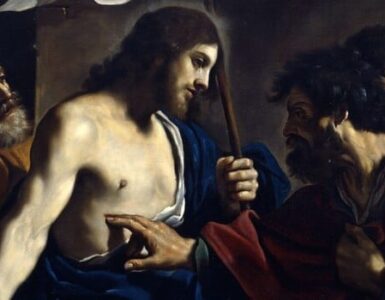This Present Paradise: A Series of Reflections on St. Elizabeth of the Trinity
(Read part 7 here)
My Dad teetered on the ladder, balancing both a paint can and a Baltimore Catechism. “Why did God make you?” he hollered down, quizzing me as I sat cross-legged on the grass underneath.
“To know Him, to love Him, and to serve Him in this world, and to be happy with Him forever in the next,” I answered almost absent-mindedly, watching him swipe green paint on the window frames.
Dad was determined to supplement my questionably “Catholic” education with some solid theology, even if he had to do it from the top of a ladder on a summer afternoon. And all these years later, I am grateful he did – drilling into me the basic answer to our fundamental questions: Why am I here? What is my purpose?
How much pain could we save ourselves if we could embrace and live the reason of our existence? It is not success, or money, or even a legacy. It is, in a word, love. We are created out of love, in love, and for love.
St. Thérèse of the Child Jesus revealed in her autobiography the moment when, distressed by her desires to perform the greatest deeds of all the saints, she elatedly discovered her own vocation:
I saw that all vocations are summed up in love and that love is all in all, embracing every time and place because it is eternal.
In a transport of ecstatic joy, I cried: “Jesus, my Love, I have at last found my vocation; it is love!”
And while Thérèse lived this out in a higher and more perfect way than we ever will, still, as she said, “all vocations are summed up in love.” So the question for all of us which remains is, “How will Ilove? How will I live out this universal call in my own individual life?”
The Catechism of the Catholic Church tells us that there are two primary ways:
Both the sacrament of Matrimony and virginity for the sake of the Kingdom of God come from the Lord himself. It is he who gives them meaning and grants them the grace which is indispensable for living them out in conformity with his will. Esteem of virginity for the sake of the kingdom and the Christian understanding of marriage are inseparable, and they reinforce each other. (1620)
Elizabeth Catez did not have to discern between the two. Even as a very little girl, she had her characteristically stubborn heart set on one vocation. She desired, more than anything, to live the prophetic mystery of spousal union as a bride of Christ.
Virginity for the sake of the kingdom of heaven is an unfolding of baptismal grace, a powerful sign of the supremacy of the bond with Christ and of the ardent expectation of his return, a sign which also recalls that marriage is a reality of this present age which is passing away. (CCC1619)
When she was only seven years old, Elizabeth and her mother and sister visited an old family friend, Canon Angles, the parish priest of Madame Catez’s hometown. Slipping away from the children’s games, Elizabeth climbed onto his knee and whispered a secret: “I want to be a nun!”
The priest, who had known her since she was a baby, could already sense something special in her and had little doubt that she had a true vocation. But someone else had overheard the conversation. And she was less than happy.
Newly widowed, Elizabeth’s mother had already lost so much. The thought of surrendering her daughter, too, was paralyzing. She hoped Elizabeth would forget about this ‘secret’ and kept her as busy as possible with music lessons and studies. But little Elizabeth would sometimes sneak into the attic with her friend, and draped in her mother’s long black dresses, pretend that they were nuns.
Before long, the playacting gave way to a real calling. Just before she turned fourteen she was making her thanksgiving after communion and felt drawn by an irresistible invitation to take Jesus as her spouse. Right then and there, she made a vow of virginity. “We said nothing to each other,” she recalled, “but we gave ourselves to each other by loving each other so strongly that my resolution to be all His became still more definitive in me.” The fact that this vow most likely occurred on July 16, the Feast of Our Lady of Mt. Carmel, would prove to be prophetic. But she didn’t know it just yet.
Where she would live out her vocation would come to her just ten days later. Again, after communion, she was praying when “the word Carmel was pronounced in my soul, and from then on I thought only of burying myself behind its grilles.”
It would be a long time before the word would become a reality. But it would be a necessary time, a time of learning to die to herself and of being willing to hand back to God even the dream of Carmel. Even our vocations, our pathways to God, are only the means to an end – the end is God himself.
Elizabeth would learn in the long wait that God was not confined to Carmel but already lived within her – and that, in the words of the Baltimore Catechism, to be happy with Him forever in the next world can actually begin right now, in this one.
This article is reprinted with permission from our friends at SpiritualDirection.com.













